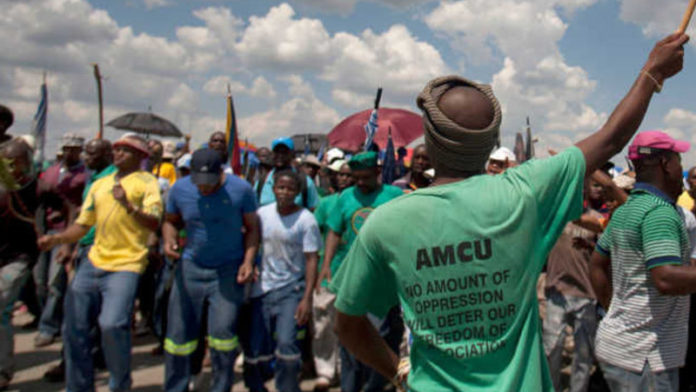
SIBANYE-Stillwater’s gold operations are expected to grind to a halt on Wednesday after unions said yesterday they would embark on their long-threatened strike following months of negotiations over wages.
In a letter signed by Jimmy Gama, the chief negotiator of the Association of Mineworkers & Construction Union (AMCU) and the National Union of Mineworker’s William Mabapa, unions said the strike would kick off with the evening shift at 6pm.
They said they remained open to negotiations to end the strike.
James Wellsted, spokesman for Sibanye-Stillwater raised hopes of eleventh hour negotiations that could see a strike averted. “We are meeting this morning with the CCMA [Commission for Conciliation, Mediation and Arbitration]. So let’s see.”
However, by the late afternoon the NUM issued a statement confirming the decision to press ahead with a strike.
Said Neal Froneman, CEO of Sibanye-Stillwater: “There are no winners in a strike. Not only would strike action undermine employment and the livelihoods of many people who depend on the South African gold operations, but employees will gain little to nothing from it.
“We urge employees to carefully consider the consequences of strike action on them personally and collectively. Strike action will only serve to jeopardise the sustainability of our gold operations and, ultimately, their futures.”
He said last week his company would not yield. “We will not be changing our offer; our offer is final … That needs to be clear,” he said of the prospects of a strike.
Sibanye-Stillwater’s latest revised wage offer is for a R700 increase and a R100 increase in the living out allowance annually for three years for surface and underground miners. Artisans, miners and officials will get increases of 5% a year over the course of the multi-year agreement, according to Sibanye-Stillwater’s offer.
UASA and Solidarity, which joined a coalition last year in order to negotiate with Sibanye-Stillwater, have since accepted the company’s latest offer.
Sibanye-Stillwater’s gold division comprised about 7% of its earnings before interest, tax, depreciation and amortisation (EBITDA) for the 12 months ended December 31. But the operations produced a cash loss.
The group reported record headline earnings of R36.9bn for the 12 months to December representing a year-on-year increase of 27%. A final dividend of R5.3bn or R1,83 a share, was declared taking the total dividend to R4,79/share or R13.8bn.
The financial performance was driven by its production of platinum group metals from the South African and US mines.
The timing of the strike is unfortunate for Sibanye-Stillwater as the war in Ukraine has helped push up the rand gold price to its highest level in more than a year.
UBS the Swiss bank, said it did not envisage a protracted strike given the “… limited success of previous strike action [and] cumulative strike fatigue”. The principle of ‘no work, no pay’ against the backdrop of the weak economic environment in South Africa would also weaken the resolve of unions, it said.
Sibanye-Stillwater guided to gold production of between 813,000 and 873,000 ounces for the 2022 financial year at an all in sustaining cost of between $1,810 and 1,920/oz.










